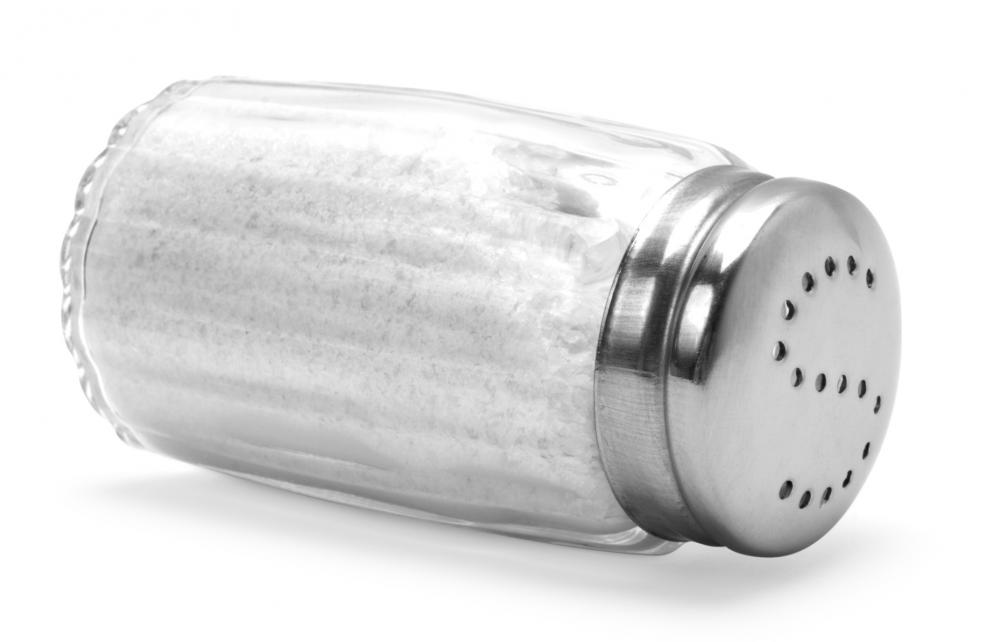At WiseGEEK, we're committed to delivering accurate, trustworthy information. Our expert-authored content is rigorously fact-checked and sourced from credible authorities. Discover how we uphold the highest standards in providing you with reliable knowledge.
What is the Importance of Dietary Iodine?
Dietary iodine is important for thyroid function. In people with prolonged iodine deficiency, not only is the thyroid at risk, but so is brain development. People who do not get enough iodine in their diets can develop intellectual disabilities, and iodine deficiency is the leading preventable cause of intellectual disabilities worldwide. Many nations have required iodine supplementation of food supplies in order to keep their populations healthy.
Natural sources of iodine include fish, seaweed, sea salt, and plants that grow in soil enriched with iodine, such as soil fertilized and mulched with seaweed and fish. People can also receive dietary iodine through supplementation, as seen with salt, and it is also present in some medications. For healthy adults, the daily recommended amount is 150 micrograms. People who eat a balanced diet and have access to iodized salt usually meet this dietary requirement without the need for additional supplementation.

In the body, dietary iodine enters the gut, where it is absorbed. It makes its way to the thyroid and is used in the production of thyroid hormones. Low iodine levels result in the inability to make enough hormones. The body responds to low hormone levels by producing thyroid stimulating hormone. Over time, this causes the thyroid to swell. Meanwhile, the hormone deficiency leads to problems with brain development. Historically, people with intellectual disabilities due to iodine deficiencies were said to have “cretinism,” and this term is still used clinically in some regions.

Getting enough dietary iodine is critical for thyroid health and brain development. While people only need trace amounts of this mineral, if they experience prolonged deficiencies, it can have a permanent impact on their lives. People can also develop health problems as a result of excess iodine consumption, a concern only at very high levels.
The widespread adoption of iodized salt has prevented many cases of iodine deficiency worldwide. Salt was chosen for this supplementation because it is cheap and widely used. Chronic iodine deficiency continues to be a problem in some developing nations where iodized salt is not widely available and where people may not have access to the foods they need in order to eat a balanced diet. Charitable organizations concerned with global health issues are involved in increasing the distribution of dietary supplements and healthy foods to regions in need, including refugee camps, areas with harsh environments, and impoverished communities. These food distributions ensure that people get the dietary iodine they need, along with other key nutrients and minerals.
AS FEATURED ON:
AS FEATURED ON:













Discussion Comments
Thyroid disease is actually one of the most common disorders in the US. It was recently published in a health magazine. I find that baffling because practically every salt on the market has iodine and it's accessible everywhere.
So clearly, lack of dietary iodine is not the only cause of thyroid problems. It's probably just one cause and it's really not a risk in the Western hemisphere and in developed countries. It's a risk in developing countries.
@candyquilt-- Yes, I think so.
I know that iodine deficiency is common in mountainous areas of the world. The Himalayas in Pakistan for example. The people who live in that are are at risk of iodine deficiency because the salt doesn't have it. Thyroid disease and goiter is very common. I think it has been improving though because people are starting to learn that they need salt with iodine.
Those who live near the shoes and consume fish and seafood regularly usually don't have this problem. In fact, when I had an under-functioning thyroid, I was told to eat a type of seaweed by a friend who lives on the shore, because it's rich in iodine.
Oh sea salt naturally has iodine? I didn't know this. I have been avoiding sea salt despite hearing about its health benefits because I thought that it didn't have iodine. So it's actually regular salt that doesn't have iodine, that's why they have to add it right?
Post your comments